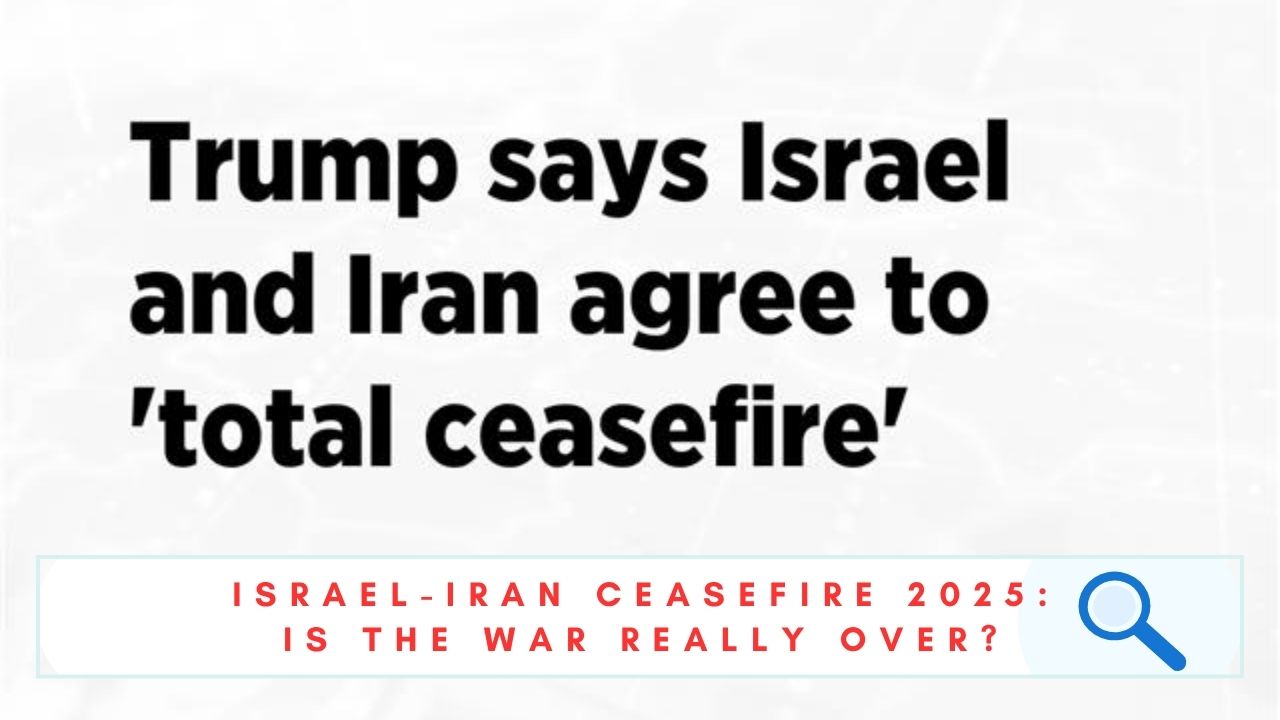Israel-Iran Ceasefire 2025: Is the War Really Over?
After nearly two weeks of escalating conflict, the world stunned by the unexpected announcement of a ceasefire between two of the Middle East’s most volatile powers. The Israel-Iran ceasefire declared on June 23, 2025, by current U.S. President Donald Trump, was hailed as a “complete and total” cessation of hostilities following the so-called 12-Day War. But while this development has sparked hope across war-torn regions and financial markets alike, many remain skeptical. Could this fragile agreement really mean the end of another chapter in the Iran-Israel saga – or is it merely a pause in an ongoing shadow war? (Read more on how the U.S. bombing of Iran sparked fears of World War III)

Understanding the Israel-Iran Ceasefire 2025 Agreement
What Led to the Israel-Iran Ceasefire?
The recent ceasefire followed a cascade of events that began with Israeli airstrikes on suspected Iranian nuclear facilities earlier this month. In retaliation, Iran launched a series of drone and missile attacks on Israeli military posts and urban centers. The rapid escalation drew global concern, prompting backchannel negotiations facilitated by the U.S. and Qatar. According to Reuters, the Trump-led negotiation team included Vice President J.D. Vance and Secretary of State Marco Rubio.
Terms and Conditions of the Israel-Iran Ceasefire
While specific details remain undisclosed, insiders suggest the ceasefire includes an immediate halt to cross-border hostilities, disengagement of forces near flashpoint areas, and a temporary freeze on cyberattacks. Iranian forces reportedly began standing down late Monday night, with Israeli compliance to follow. The Guardian reported that the ceasefire would unfold in “phased implementation” with outside monitoring from Qatar and Oman.
Global Reactions to the Israel-Iran Ceasefire
How World Leaders Responded to the Israel-Iran Ceasefire
The White House issued a brief statement applauding the agreement and emphasizing the importance of ongoing dialogue. European Union officials welcomed the move cautiously, warning that “long-term peace requires more than just silence between bombs.” Meanwhile, countries like Saudi Arabia and Turkey offered measured optimism, calling the ceasefire a “necessary but insufficient” step.
Media Coverage and Public Statement
From Tel Aviv to Tehran, the announcement was met with a mix of relief and suspicion. In Israel, right-wing politicians expressed concerns over Iran’s long-term intentions. On social-media, hashtags like #CeasefireHope and #MiddleEastPeace trended globally. Independent watchdog groups have urged transparency, warning that many past ceasefires have collapsed due to vague terms and lack of accountability.
Can the Israel-Iran Ceasefire Hold?
Historical Ceasefires Between Israel and Iran (or Proxies)
History provides little comfort. The Israel-Iran conflict is rarely direct but often fought through proxies like Hezbollah in Lebanon or Iranian-backed militias in Syria and Iraq. Ceasefires – when declared – are often temporary and frequently violated. Experts point to the 2020 Gaza ceasefire as a case where de-escalation quickly unraveled within weeks.
Key Risks That Could Break the Israel-Iran Ceasefire
The biggest threats to this truce are not necessarily the two nations’ armed forces, but rather non-state actors. Groups like Hezbollah, Hamas, or even rogue units within the Iranian Revolutionary Guard may not comply. There are also fears of cyber retaliation. Analysts from Al Jazeera have noted that both sides maintain offensive cyber capabilities capable of igniting conflict with a keystroke.
What the Israel-Iran Ceasefire Means for the Future
Diplomatic Opportunities and Challenges
For the first time in years, there’s an opening – however narrow – for diplomatic re-engagement. Some experts are calling for a regional summit involving the U.S., Israel, and Gulf states to establish long-term frameworks for de-escalation. However, mistrust remains high. A formal peace agreement still seems far-fetched unless deeper concessions are made on both sides, especially concerning Iran’s nuclear ambitions.
Impacts on Oil, Economy, and Regional Stability
Markets responded quickly. Oil prices fell 4% following the announcement, and global equities rose amid eased war concerns. Economists caution, though, that volatility could return if hostilities resume. Border communities in Lebanon, Syria, and Iraq remain on high alert, as many fear that the ceasefire’s geographic limits are still ambiguous.
Conclusion
The Israel-Iran ceasefire may offer a much-needed pause, but the scars of war, geopolitical rivalries, and ideological divides haven’t disappeared. As the world watches closely, one must ask: Is this truly the end – or just an intermission before the next act? For now, peace hangs in the balance, fragile as glass and just as easy to shatter.






One Comment
Ed
Can there be real peace? I doubt! Governments often compete against one another.